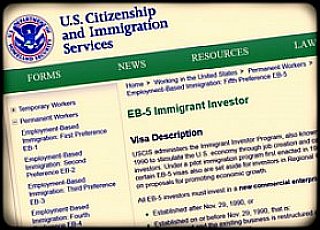
Some of the grim details about state-government-level mismanagement in Vermont of the massive Jay Peak EB-5 scandal have emerged in further coverage of this long-running story by the alternative news site VT Digger.
The federal immigrant investor (EB-5) program provides a family-sized set of green cards to aliens who pony up at least half a million dollars to invest in a Department of Homeland Security approved, but not guaranteed, investment, usually in real estate.
Most state governments have nothing to do with the program — to their relief — but Vermont, South Dakota, and briefly, Michigan, have played middleman roles, leading to huge scandals in the first two states. These three states created DHS-approved regional centers, accepted investments from would-be immigrants, and passed the money along to States-side developers. All three are now closed.
The overall story is that the federal agency in charge, USCIS, let questionable players handle the aliens' money with little oversight, and in Vermont and South Dakota, the state agencies were equally negligent, to stay the least.
As both VTDigger and CIS (see here and here) have reported over the years, more than $50 million in investor funds went missing in a series of frauds masterminded by Florida-based Ariel Quiros and locally managed by his Vermont-based partner, Bill Stenger. A larger total, of "mismanaged" if not lost funds, is $200 million. Some of the money was involved in an (operating) ski resort, Jay Peak, some in a never-built, Korea-related human organs laboratory, AnC Bio, and some in various other projects.
What is new is that, because of a private civil suit, much previously unreported information has emerged about the internal workings of Vermont's government on the issue. Here is a list of some of the key players, other than Quiros and Stenger:
- Vermont's Governor from 2011-2017, Peter Shumlin (D);
- Shumlin's then-Deputy Chief of Staff and former campaign manager, Alex MacLean;
- Vermont's then-Commerce Secretary, Lawrence Miller; and
- The former Director of the state's EB-5 Regional Center, Brent Raymond.
The suit was brought on behalf of some of the foreign investors who lost money in the program. They are represented by attorney Russell Barr.
According to the VTDigger report:
Stenger had a close relationship with [U.S. Sen. Patrick] Leahy [D-Vt.] and Quiros was close with Shumlin. Both politicians received large campaign contributions from Jay Peak.
Barr secured a long deposition from Raymond, in which the latter said that he was blocked again and again as he sought more information, such as regular quarterly financial reports, from Quiros and Stenger. He said that he repeatedly sought audits of the EB-5 funds but was told by his superiors to back off.
Such audits would have shown, as we learned years later, the loss and mismanagement of substantial amounts of EB-5 funds, including the placement of some of them in Quiros' margin accounts with the broker Raymond James. Margin accounts are set up for stock speculators; they are hardly the appropriate location for funds in a government-supervised investment program, but then the governments involved were asleep at their various switches. (Raymond James has since paid a huge penalty, $149 million, for its part in the scheme.)
One of the more telling items in the VTDigger piece (by its editor Anne Galloway) was this:
[Brent] Raymond had received a certified letter from an attorney in South Korea that didn't adequately address his concerns about whether Alex Choi was Ariel Quiros' brother-in-law. Choi was a long-time business partner of Quiros and the owner of AnC Bio Korea. He was prosecuted by the [South] Korean government for defrauding investors in 2012 — the same year an identical project was brought to Vermont and approved by Miller. The question about the exact nature of his relationship with Quiros is unresolved.
Raymond asked MacLean if he could follow up "and was told no. Lay off."
Questions about Quiros' family ties in relationship to AnC Vermont, MacLean told him were "off limits," Raymond said. He recalled that she [MacLean] said: "You don't speak to Bill Stenger that way."
Galloway also reported:
Stenger had immense political clout in Vermont — having testified in Congress about EB-5, traveled on a trade mission with Leahy to Ireland, and on multiple occasions being named Vermont Chamber of Commerce's "man of the year."
I can personally confirm part of that sentence. On December 7, 2011, the full U.S. Senate Judiciary Committee met to hear testimony on the extension of the heart of the EB-5 program; seated to my right at the witness table was the pro-EB-5 Stenger, who had been invited to the session by then-Chairman Leahy; I had been recruited to speak as a critic of the program by the staff of Sen. Grassley (now chairman of the committee). The committee (and later Congress) voted to extend the program. (The program nominally expires, again, at the end of this month, but is expected to be re-authorized in one of the pending appropriations bills.)
Both Sens. Leahy and Grassley now agree that the program should be terminated.
While what Brent Raymond said in his deposition fits neatly with many other accounts of what happened, some opposing lawyer is sure to ask him: "If things were that bad, for so long, why did you stay in the job for three years?"
Perhaps he would answer, as some anonymous "senior officials" have said in the Trump administration, "I was just trying to prevent it from getting worse."
And maybe he was.
